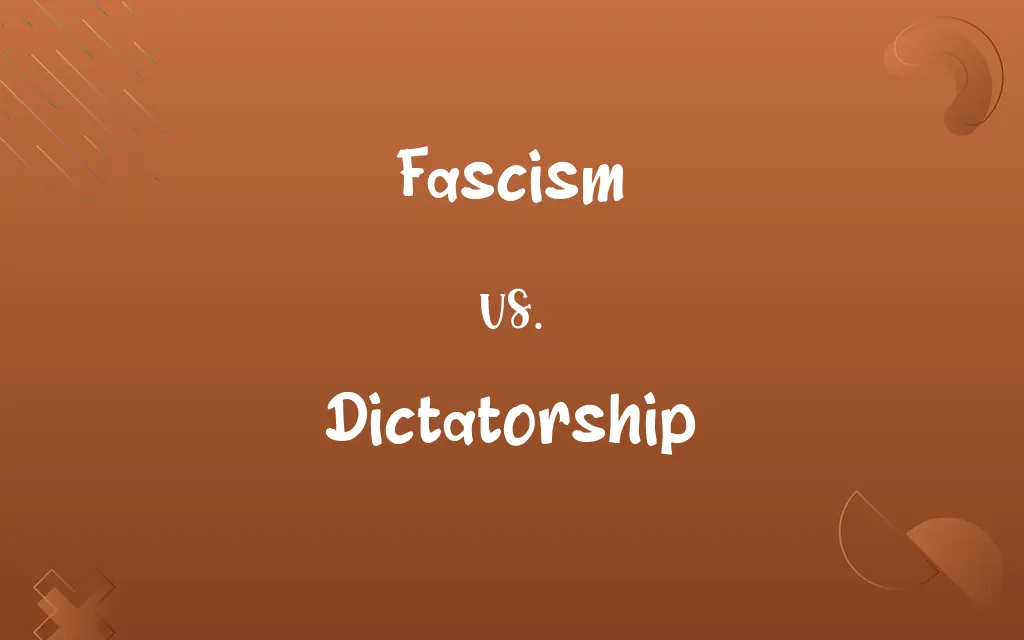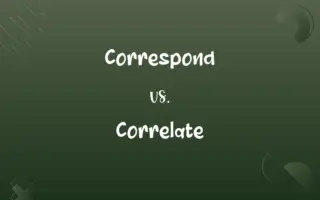Fascism vs. Dictatorship: Know the Difference

By Hifza Nasir & Shumaila Saeed || Published on March 2, 2024
Fascism is a political ideology with authoritarian nationalism; dictatorship is a governance form with absolute power in one person or group, differing in ideology and structure.

Key Differences
Fascism is characterized by extreme authoritarian nationalism, emphasizing a strong central government, suppression of opposition, and often a policy of belligerent nationalism and racism. Dictatorship, on the other hand, refers to a form of government where absolute power is concentrated in the hands of a single individual or a ruling body, not necessarily tied to any specific ideological goal.
Shumaila Saeed
Mar 02, 2024
Fascist regimes tend to promote a collective identity through nationalistic and often xenophobic rhetoric, seeking to unify the nation under a single banner and ideology. Dictatorships may arise from various ideologies, including but not limited to fascism, communism, or military control, focusing more on the consolidation of power than on promoting a specific national identity.
Hifza Nasir
Mar 02, 2024
One key aspect of fascism is its emphasis on societal hierarchy and the rejection of democratic principles, advocating for a single-party state with a singular leader. While dictatorships also centralize power and often suppress political freedoms, they do not inherently advocate for a specific societal structure or reject democracy on ideological grounds.
Hifza Nasir
Mar 02, 2024
Fascism integrates economic control as part of its political strategy, often manipulating capitalism to serve the state's interests, whereas dictatorships can adopt any economic system, from capitalism to socialism, based on the dictator's preferences rather than a coherent ideological framework.
Shumaila Saeed
Mar 02, 2024
The rise of fascism is historically associated with specific movements in Europe in the early 20th century, notably in Italy and Germany, where it led to World War II. Dictatorships have been more varied in their emergence, spanning different times and contexts, from ancient Rome to contemporary regimes, reflecting the adaptability of authoritarian governance without a unified ideological stance.
Shumaila Saeed
Mar 02, 2024
ADVERTISEMENT
Comparison Chart
Ideology
Authoritarian nationalism, anti-democracy
Varies; not tied to a specific ideology
Shumaila Saeed
Mar 02, 2024
Governance
Centralized power, single-party state
Absolute power in one individual/group
Hifza Nasir
Mar 02, 2024
Economic System
Manipulates capitalism to serve state interests
Can adopt any economic system
Hifza Nasir
Mar 02, 2024
Societal Structure
Promotes societal hierarchy and unity under a national identity
Does not inherently promote a specific societal structure
Dua Fatima
Mar 02, 2024
Historical Context
Associated with European movements in the early 20th century
Varied emergence, from ancient times to the present
Dua Fatima
Mar 02, 2024
ADVERTISEMENT
Fascism and Dictatorship Definitions
Fascism
Often integrates economic control to benefit the state.
Fascist regimes manipulate economic systems to prioritize national interests.
Shumaila Saeed
Feb 28, 2024
Dictatorship
Can adopt any economic system based on the dictator's preferences.
The dictator's regime adopted socialism to consolidate power.
Hifza Nasir
Feb 28, 2024
Fascism
A political ideology that emphasizes authoritarian nationalism.
Fascism in 20th-century Europe led to widespread suppression of dissent.
Hifza Nasir
Feb 28, 2024
Dictatorship
Not necessarily tied to a specific ideology.
Dictatorships can emerge under various ideological banners, from communism to military rule.
Dua Fatima
Feb 28, 2024
Fascism
Characterized by its extreme nationalist and often racist policies.
Fascism's rise in Italy was marked by aggressive nationalism and xenophobia.
Hifza Nasir
Feb 28, 2024
ADVERTISEMENT
Dictatorship
Focuses on power consolidation rather than promoting national identity.
Unlike fascism, dictatorship does not inherently push for a unified nationalistic identity.
Hifza Nasir
Feb 28, 2024
Fascism
Advocates for a strong centralized government and societal hierarchy.
Fascism seeks to unify the nation through a collective national identity.
Hifza Nasir
Feb 28, 2024
Dictatorship
A form of government with absolute power concentrated in one person or group.
The dictatorship was characterized by the absence of political freedom.
Hifza Nasir
Feb 28, 2024
Fascism
Rejects democratic principles, promoting a single-party state.
Under fascism, the government suppresses political opposition to maintain control.
Hifza Nasir
Feb 28, 2024
Dictatorship
Emergence varies widely across history and context.
Dictatorships have been established in different forms throughout history, reflecting the versatility of authoritarian rule.
Dua Fatima
Feb 28, 2024
Fascism
A political theory advocating an authoritarian hierarchical government (as opposed to democracy or liberalism)
Shumaila Saeed
Feb 27, 2024
Fascism
A political philosophy or movement based on or advocating such a system of government.
Hifza Nasir
Feb 27, 2024
Dictatorship
The office, or the term of office, of a dictator; hence, absolute power.
Hifza Nasir
Feb 27, 2024
Dictatorship
A type of government where absolute sovereignty is allotted to an individual or a small clique.
Hifza Nasir
Feb 27, 2024
Fascism
A political theory advocating an authoritarian hierarchical government; - opposed to democracy and liberalism.
Hifza Nasir
Feb 27, 2024
Dictatorship
A form of government in which the ruler is an absolute dictator (not restricted by a constitution or laws or opposition etc.)
Hifza Nasir
Feb 27, 2024
Fascism
A system of government marked by centralization of authority under a dictator, a capitalist economy subject to stringent governmental controls, violent suppression of the opposition, and typically a policy of belligerent nationalism and racism.
Hifza Nasir
Feb 27, 2024
Fascism
Any right-wing, authoritarian, nationalist ideology characterized by centralized, totalitarian governance, strong regimentation of the economy and society, and repression of criticism or opposition.
Shumaila Saeed
Feb 27, 2024
Fascism
An authoritarian system of government under absolute control of a single dictator, allowing no political opposition, forcibly suppressing dissent, and rigidly controlling most industrial and economic activities. Such regimes usually try to achieve popularity by a strongly nationalistic appeal, often mixed with racism.
Hifza Nasir
Feb 27, 2024
Repeatedly Asked Queries
How does fascism affect the economy?
Fascist regimes manipulate the economy to serve state interests, often integrating private enterprise with government control.
Dua Fatima
Mar 02, 2024
What distinguishes a dictatorship's governance structure?
A dictatorship is defined by the concentration of power in the hands of an individual or ruling body, rather than a specific governance structure or ideology.
Hifza Nasir
Mar 02, 2024
What is the main difference between fascism and dictatorship?
Fascism is a specific political ideology with authoritarian nationalism, while dictatorship is a form of governance characterized by absolute power in one person or group, without a fixed ideological basis.
Shumaila Saeed
Mar 02, 2024
Can a fascist regime be a dictatorship?
Yes, fascism often manifests as a dictatorship with a singular leader embodying the state's power and ideology.
Hifza Nasir
Mar 02, 2024
Do all dictatorships follow fascist principles?
No, dictatorships can arise from various ideologies and do not necessarily adhere to fascist principles.
Hifza Nasir
Mar 02, 2024
How do dictatorships maintain control?
Through suppression of political freedoms, control of the media, and sometimes through the support of military or security forces.
Hifza Nasir
Mar 02, 2024
Is fascism inherently racist?
Historically, fascist ideologies have often included elements of racism and xenophobia, though racism is not a defining feature of fascism itself.
Dua Fatima
Mar 02, 2024
What historical examples illustrate the difference between fascism and dictatorship?
Mussolini's Italy exemplifies fascism, while Stalin's Soviet Union, though a dictatorship, was not fascist but communist.
Hifza Nasir
Mar 02, 2024
How do fascist and dictatorial regimes impact society?
Both tend to suppress dissent and control various aspects of life, but fascism specifically seeks to mold society according to its ideological goals.
Shumaila Saeed
Mar 02, 2024
Can dictatorships evolve from other forms of government?
Yes, dictatorships can emerge from democratic or other governmental forms when power becomes concentrated in one person or group.
Hifza Nasir
Mar 02, 2024
Why is nationalism important in fascism?
Nationalism is a core component of fascism, used to unify the population under a common identity and suppress dissent.
Dua Fatima
Mar 02, 2024
Can a dictatorship exist within a democratic system?
Typically, dictatorships suppress democratic principles, but transitions to or from democracy can occur through various means.
Hifza Nasir
Mar 02, 2024
What can lead to the fall of fascist or dictatorial regimes?
Internal dissent, economic failure, military defeat, or international intervention can lead to the downfall of these regimes.
Shumaila Saeed
Mar 02, 2024
How do economic policies differ between fascism and dictatorships?
Fascist economic policies are designed to serve the state's interests, often through a controlled form of capitalism, whereas dictatorships may employ any economic system.
Hifza Nasir
Mar 02, 2024
What role does ideology play in distinguishing fascism from dictatorship?
Ideology is central to fascism, which promotes a specific set of nationalist and authoritarian beliefs, whereas dictatorships may not be ideologically driven.
Hifza Nasir
Mar 02, 2024
Share this page
Link for your blog / website
HTML
Link to share via messenger
About Author
Written by
Hifza NasirCo-written by
Shumaila SaeedShumaila Saeed, an expert content creator with 6 years of experience, specializes in distilling complex topics into easily digestible comparisons, shining a light on the nuances that both inform and educate readers with clarity and accuracy.







































































